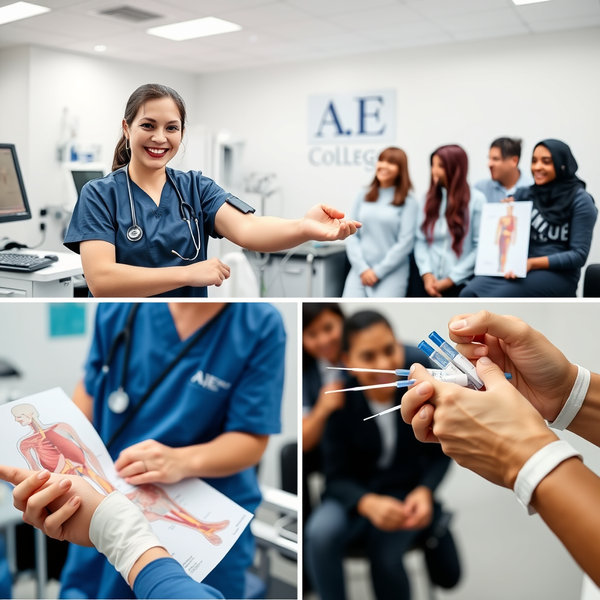Level 3 Certificate in Phlebotomy Practice

About Course
Qualification Overview
The AJE College Phlebotomy course is a comprehensive training programme designed to equip learners with the theoretical knowledge and practical skills required to work as a professional phlebotomist in a clinical setting. The course covers key aspects of human anatomy, blood collection procedures, laboratory protocols, and professional standards essential for effective practice in the healthcare sector.
Aims and Objectives
- To develop a foundational understanding of anatomy and physiology relevant to phlebotomy.
- To provide hands-on training in venipuncture techniques using both simulation equipment and supervised clinical practice.
- To introduce learners to pathology laboratory processes, safety standards, and infection control.
- To prepare learners for employment as phlebotomists in GP surgeries, hospitals, clinics, or community health settings.
Learning Outcomes
Upon successful completion of this course, learners will be able to:
- Identify veins and perform safe and effective venipuncture procedures.
- Demonstrate knowledge of blood collection equipment and order of draw.
- Apply infection control and safety procedures in line with national standards.
- Understand the principles of confidentiality, consent, and legal aspects of phlebotomy.
- Work within the professional code of practice, adhering to quality assurance measures.
- Communicate effectively with patients and colleagues in a healthcare environment.
Course Duration
The course includes a combination of classroom instruction, dry lab practice, and live clinical sessions. Course duration is typically delivered over several weeks to allow adequate theory instruction and practical experience.
Entry Requirements
- Learners must be 18 years or older.
- A basic understanding of English and Maths is required.
- No previous medical background is necessary, although experience in a health or care setting may be advantageous.
Who this Course is For
This course is suitable for:
- Individuals looking to start a career in healthcare as a phlebotomist.
- Healthcare assistants or support workers seeking to upskill.
- Professionals wishing to add phlebotomy as a skill for career development.
- Those seeking to move into more advanced roles such as cannulation and IV drug administration.
Mandatory Units
Unit I: Human Body
- Anatomy and Physiology Essential to Phlebotomy
- Integument System
- The Circulatory System, Veins used for Venipuncture, Structure of the Vein Wall
Unit II: Phlebotomy Blood Collection Procedures
- Blood Collection Equipment, Blood Tubes and Additives, Order of Draw
- Needles, Needle Stick Injury, Gloves and Glove Removal, Tourniquets, Evacuated and Butterfly Collection Systems
- Patient Identification
- Preanalytical Considerations
- Vein Site Selection
- Venipuncture Techniques and Procedures
- Complications
- Patient Confidentiality, Consent, Referral
- Bleeding Disorders
Unit III: Phlebotomy and the Pathology Laboratory
- Whole Blood and Components
- Pathology Laboratory and Common Blood Tests
- Troubleshooting Guidelines
- Medical Terminology
Unit IV: Phlebotomy History
- Phlebotomy Past and Present
- Quality Assurance, Legal Issues, Phlebotomy Standards and Code of Practice
- Infection Control, Safety, Personal Wellness, Standard Precautions
Unit V: Phlebotomy Training Course
Part I – Dry Lab: Practical Phlebotomy skills on simulation arms
Part II – Live Bleed: Clinical sessions with live blood draws in a GP practice
Assessment Methods
- Multiple-Choice Questions (MCQs): Assess theoretical understanding of course content.
- Observation and Assessment: Includes supervised live blood draws conducted in a GP clinic. Learners will first practice on simulation arms before progressing to live patients under professional supervision.
An optional CPD-certified Advanced Phlebotomy Training module is available for learners seeking additional skills in cannulation for intravenous drug administration and the handling and transportation of special laboratory specimens.
Career Progression and Further Education
Successful candidates will be qualified to work as trained phlebotomists in a range of clinical environments including:
- NHS and private hospitals
- GP surgeries
- Diagnostic laboratories
- Community health settings
With further training, learners may progress into senior phlebotomy roles, healthcare assistant roles, or clinical support worker positions.
Further Education Opportunities
- Level 3 Diploma in Healthcare Support
- Advanced Cannulation and IV Drug Administration Training
- Access to Nursing or Allied Health Programmes
- Laboratory Technician Courses
Salary Expectations
Entry-level phlebotomists in the UK can expect to earn between £20,000 – £24,000 per annum. With experience and additional qualifications, salaries may rise to £26,000 – £30,000+ depending on the role, region, and setting.
